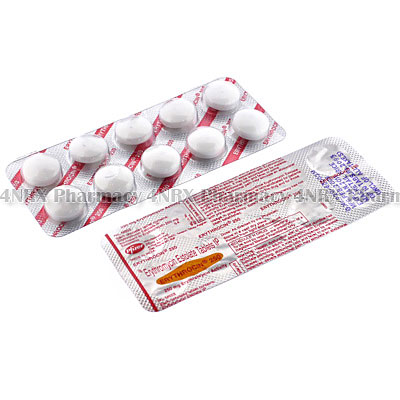 |
Home  Infection Infection  Erytheocin (Erythromycin Estolate) Erytheocin (Erythromycin Estolate) |
|
|||||||||
|
|
Erytheocin (Erythromycin Estolate) (eh-rith-row-my-sin Ess-toe-late)
What is Erytheocin (Erythromycin Estolate) used for? Erytheocin (Erythromycin Estolate) is an oral macrolide antibiotic prescribed to treat patients suffering from a wide variety of bacterial infections. The medication operates by slowing or stopping the reproduction of bacteria cells allowing the immune system to control or destroy the infection. This action makes it useful for treating infections affecting the lungs, respiratory tract, middle ear, skin, soft tissues, eyes, digestive tract, prostate, or other bacterial conditions such as Gonorrhoea or syphilis. Your doctor may also recommend its use for the treatment of other unlisted conditions. How should I use Erytheocin (Erythromycin Estolate)? Erytheocin (Erythromycin Estolate) is normally prescribed to be taken once or twice daily at a dosage of one tablet for a cycle of medication lasting one or two weeks, but your individual directions will be determined by your doctor based on your age, weight, health condition, the condition being treated, and the severity of your symptoms. These should be swallowed with a full glass of water and may be taken with or without food, although a meal or snack is recommended before use if you get an upset stomach. Never split, chew, or crush the tablets before use to avoid destroying or altering the effects of their contents. Do not stop taking the medicine before being told to do so, even if your symptoms seem to have disappeared, as the infection may return stronger or more resistant to treatment. Ask your doctor any questions you have about the medicine to ensure the correct usage. What are the side effects of Erytheocin (Erythromycin Estolate)? Erytheocin (Erythromycin Estolate) may cause side effects in some patients such as:
Stop using the medicine and contact your doctor as soon as possible if you experience any serious side effects such as severe headaches, dizziness, irregular heartbeats, hearing problems, severe diarhoea that is bloody or watery, liver problems, or severe skin rashes. These conditions may require lower doses, reduced application frequency, or emergency medical attention in serious cases to prevent further health complications from occurring. Please Note Erytheocin (Erythromycin Estolate) should not be used by patients who are allergic to erythromycin, allergic to similar medications, or who have had a bad reaction to similar treatments in the past. Also inform your doctor if you have myasthenia gravis, an abnormal heart rhythm, porphyrias, decreased liver function, or severely reduced kidney function. These conditions may cause unexpected health problems requiring adjustments to your regimen. Strictly use Erytheocin (Erythromycin Estolate) as prescribed and follow all instructions provided by your doctor. Safe, suitable, and optimum dosage can vary and is dependent on the patient`s health and medical history, as well as the condition you are treating. Erytheocin (Erythromycin Estolate) may not be safe or suitable for all patients. Always ensure your doctor is informed if you are pregnant or breastfeeding, using any other type of medication (including non-prescription medicine, vitamins, and supplements), as well as if you have any allergies, other illnesses, or pre-existing medication conditions. Seek immediate medical attention or proceed to your nearest accident and emergency department if you suffer a hypersensitive or allergic reaction. Symptoms usually present during a reaction of this nature include difficulty breathing or swallowing, swelling of the limbs or face, tight chest, hives, and skin rashes. 
|
||||||||||||||||||